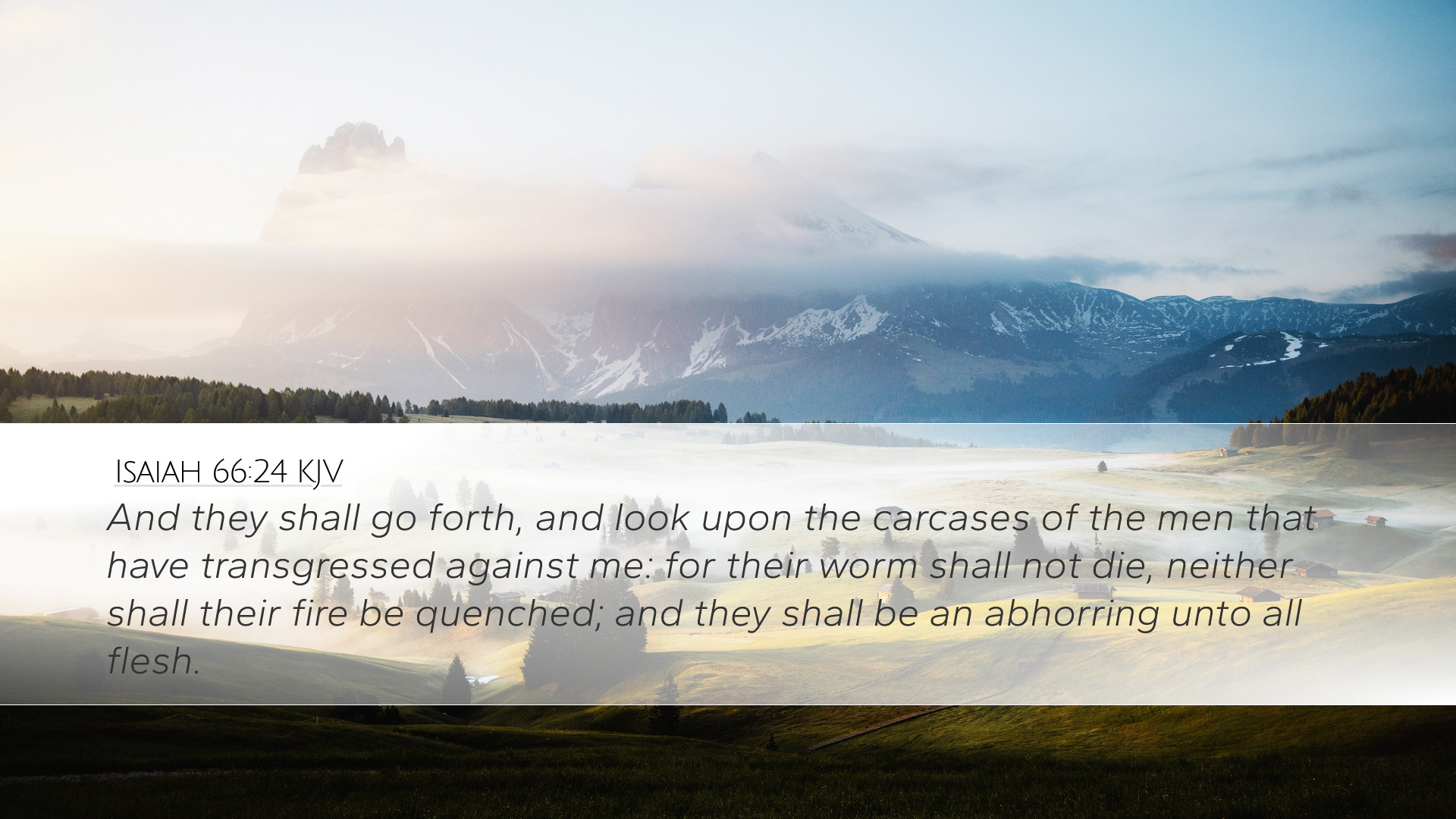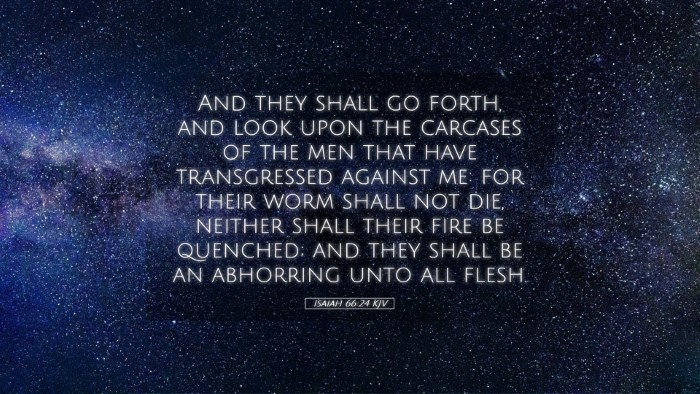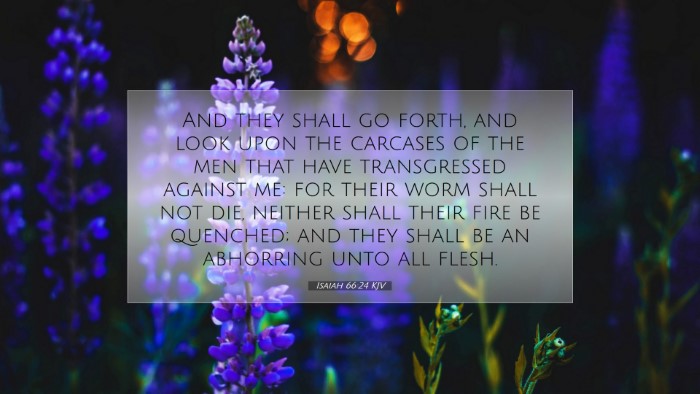Bible Commentary on Isaiah 66:24
Verse: "And they shall go forth, and look upon the carcasses of the men that have transgressed against me: for their worm shall not die, neither shall their fire be quenched; and they shall be an abhorring unto all flesh." (Isaiah 66:24)
Introduction
This verse from the book of Isaiah serves as a concluding remark to the prophetic insights delivered throughout the chapter. It encapsulates an important theme of divine judgment against transgression while contrasting it with the promise of salvation and restoration for the faithful. The imagery used here is stark and vivid, offering profound insights into the nature of sin, judgment, and the eternal consequences that follow.
Contextual Overview
Isaiah 66 concludes the prophetic book with a vivid contrast between the fate of the righteous and the wicked. The Lord expresses His sovereign role as both the savior of the faithful and the judge of those who oppose Him. Understanding the cultural and theological context is vital for interpreting the meaning of this verse properly.
Historical Context
This passage serves as a stark reminder of God’s justice manifested in judgment against sinners. Israel, having struggled with idolatry and injustice, receives a warning of the ultimate consequences of their choices. The imagery may also connect to the historical invasions and the desolation faced by Judah, resonating with the personal and communal ramifications of sin.
Theological Significance
Isaiah’s prophecy often interweaves themes of judgment and hope. In 66:24, the message shifts into one of eternal consequence. The concept of the undying worm and unquenchable fire introduces themes of eternal damnation, signifying the irreversible consequences of rejecting the divine.
Commentary Insights
Matthew Henry's Commentary
Matthew Henry highlights the terrors of hell and the fate awaiting those who transgress against God. He notes that the "carcasses" signify not only physical death but a complete separation from God’s grace. The undying worm symbolizes the eternal regrets and repercussions faced by the wicked. Henry emphasizes that the fear and horror associated with these images serve as a motivating force for moral living and adherence to God's commandments.
Albert Barnes' Notes on the Bible
Albert Barnes focuses on the unquenched fire and the implications it bears for understanding divine judgment. He suggests that the imagery in this verse serves as a vivid portrayal of the eternal state of those who reject God's grace. Barnes posits that the fire is indicative of both punishment and purification, where the fire maintained is not merely for destruction but also results in continual suffering—a reflection of God’s justice.
Adam Clarke's Commentary
Adam Clarke delves into the seriosity of the verse by exploring the metaphorical significance of the "worm" and "fire." Clarke presents a theological perspective that emphasizes the permanence of God’s judgment against sinners. The presence of physical decay juxtaposed with spiritual endurance serves to highlight the eternal consequences of wickedness. He elucidates that this passage is not merely about punishment but serves to awaken moral consciousness within the community.
Interpretive Themes
-
Divine Justice: The unquenchable fire and undying worm symbolize the eternal nature of punishment for those who transgress against God’s law. This serves to remind believers of the seriousness of sin and the Holy God’s righteousness in dealing with evil.
-
Eternal Consequences: The verse encapsulates the idea of eternal consequences, not just in this life but extending to the afterlife. It brings forth the notion that life choices bear weighty consequences far beyond the temporal realm.
-
Call to Righteousness: By displaying a stark contrast between judgment and salvation, Isaiah implores the faithful to uphold righteousness, reflecting on the nature of divine expectations and the reality of judgment.
-
Sovereignty of God: The passage reinforces God's sovereignty as the ultimate judge and the arbiter of moral rectitude. It emphasizes that God’s judgments are rooted in His holiness and righteousness, a reminder to all the faithful of the God they serve.
Practical Applications
For pastors, students, theologians, and Bible scholars, Isaiah 66:24 serves as a sobering reminder of the eternal stakes involved in the matter of sin and judgment. The imagery invites theological reflection on the nature of divine justice and mercy. The contrasts presented encourage believers to pursue righteousness actively, reflecting God’s character in their lives.
As theological educators, there lies an opportunity to engage congregations and classrooms in discussions surrounding the doctrines of Hell, judgment, and the character of God. Emphasizing the serious consequences of sin can lead to profound personal and communal reflection and renewal for congregations that may take for granted the grace of God.
Conclusion
Isaiah 66:24 encapsulates the profound realities of sin and judgment with evocative imagery that serves both as a warning and a call to faithful living. Engaging with this text through the lenses of historical context, theological insights, and practical application enriches the understanding of the text and its implications for contemporary faith practice. It remains essential for the faithful to heed this solemn message, recognizing that the choices made in this life echo into eternity.


